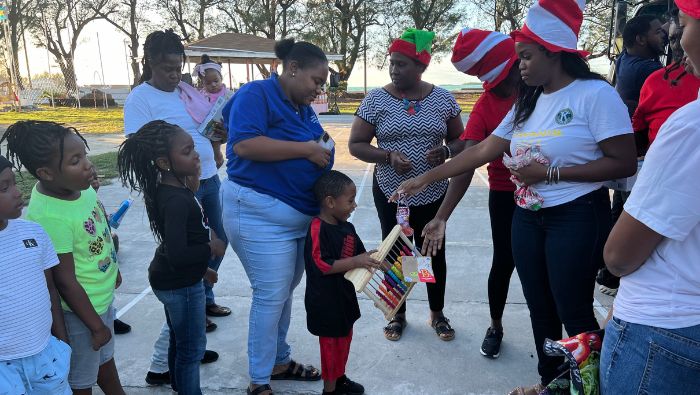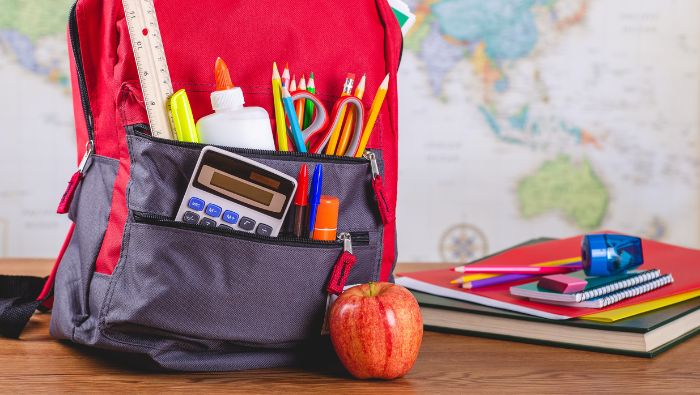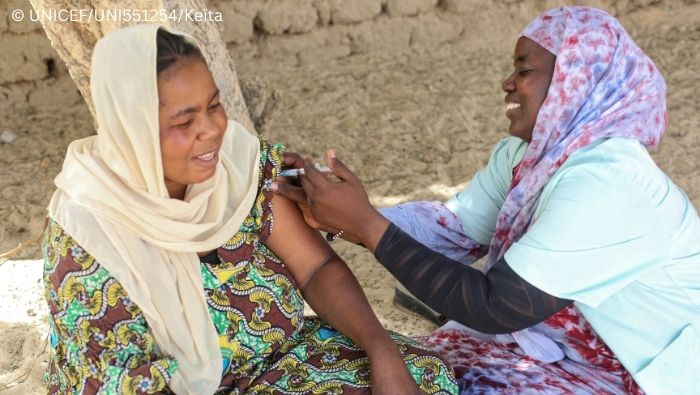
No child without Christmas
A Kiwanis club in the Bahamas delivers holiday magic in its island’s largest toy drive.
By Meredith Atwood, president, the Kiwanis Club of South Eleuthera
The Kiwanis Club of South Eleuthera, Bahamas, has been providing gifts and hope to our communities for over 50 years through the No Child Without Christmas Signature Project. In 2023, our team spent months planning and raising over B$30,000 to prepare for the day that we affectionately nicknamed “Santa’s Road Trip.” With everything from bikes and iPads for the kids to bedding for the adults, our Kiwanis club successfully pulled off the island’s largest toy drive.
To understand who the Kiwanis Club of South Eleuthera’s No Child Without Christmas Signature Project serves, first you’ll have to understand the island that I call home. Eleuthera is a passionate Bahamian island with a population just over 9,000. Growing up in Rock Sound, a southern settlement on the island, I witnessed firsthand the contrast between our community’s rich culture and extreme poverty.
Personally, I consider myself and my six sisters some of the lucky ones — we never had to worry about going to school hungry and we found presents under our tree each Christmas. This, however, was not the case for many of my peers. In a community where many families are without food, bedding and running water, Christmas gifts are a luxury that many kids will never experience.
Being private and proud is a common denominator among Eleutheran families, including my own — but for families that are struggling, these traits often lead to children suffering. The No Child Without Christmas Signature Project aims to remove the stigma of asking for help around the holidays so that the children of less fortunate families are included in the festivities and, more importantly, develop optimism and hope for a better future.
A crucial mission
Last year’s initiative saw the project’s largest turnout — a success we credit, in part, to our increased marketing efforts, which included door-to-door visits. On Eleuthera, word of mouth continues to be the most effective and accessible form of marketing. We utilized the hubs of our tight-knit communities, such as school bulletins and grocery stores, to display flyers to advertise the event. We also were grateful to have the support of our local newspapers, and we made additional efforts to advertise the event via email and social media.
As I sit here reflecting, I wish you, whoever you are reading this, could have experienced the No Child Without Christmas event firsthand. But let me try to paint a picture of my experience, both at the event and in the days leading up to it.
Our journey began with a crucial mission: to gather toys. The lack of readily available toys on Eleuthera led our team on a trip to Florida. There, we curated 1,500 gifts for the children of our communities. The feeling of purchasing such a vast number of toys was akin to the excitement I felt as a child on Christmas morning. For weeks, I counted down the days until I could see the joy on the children’s faces as they received these gifts.
Pulling into each settlement in our truck, which we fondly called our “Santa’s sleigh,” to deliver gifts was a moment like no other. The prearranged gifting sites varied from school parking lots to grocery stores, and each time we were equally overwhelmed by the local turnout. From over 500 meters away, the excited screams of children reached our ears. With our holiday music playing and dressed in our Kiwanis festive attire, our team announced over the mic, “Kiwanis are here, come get your gift!” But we needed no announcement — the children were already running toward our truck.
Every stop was special, but the moment we pulled into Rock Sound — the settlement where I grew up — will remain with me the rest of my life. As over 100 children crowded our truck, I turned to look at the parents waiting at the perimeter. They beamed with as much excitement as their children did, but there was an added layer of emotion. As a parent, all you want is for your child to feel loved and to have opportunity. No Child Without Christmas aims to ensure no child or parent feels forgotten.
What we truly gave
In the end, our signature project reached all 11 settlements of South Eleuthera and over 50% of South Eleuthera’s youth. Our team of 20 volunteers (with the help of dozens more who contributed financially), hand-delivered over 1,500 presents to youth ranging from toddlers to teenagers. For many, this would have been their first and only Christmas present.
As I write this, I am still seeing the positive impact No Child Without Christmas has had on our island. As I drive through the dirt backroads of our small communities, I see children riding their new bikes together to pick up groceries for their parents. I see others sharing their new basketballs in a pickup game. Earlier this year, a teenage girl ran up to me after recognizing me from the event. She thanked me and wanted to tell me she has been studying with her new iPad. She hopes to go to university one day. While some of these children will still return to homes without running water, they will hold on to the joy from that day of just being a kid.
While the Kiwanis Club of South Eleuthera handed out Christmas presents, make no mistake about what we truly gave the community’s future generations: a sense of hope and the knowledge that there is no shame in accepting help from a neighbor. Through the No Child Without Christmas Signature Project, we’re arming our kids with the qualities they need for a more successful future on our island.
No Child Without Christmas received the Group I Bronze Award in the 2024 Kiwanis Signature Project Contest. Get details about the 2025 contest, which opens January 7, on our contest webpage.


